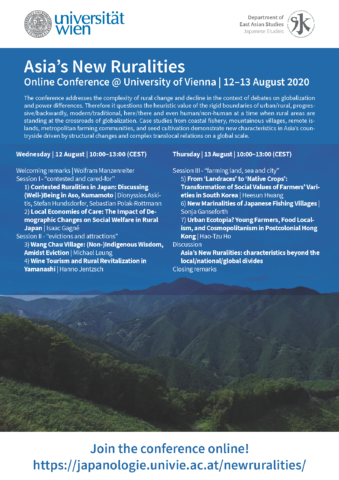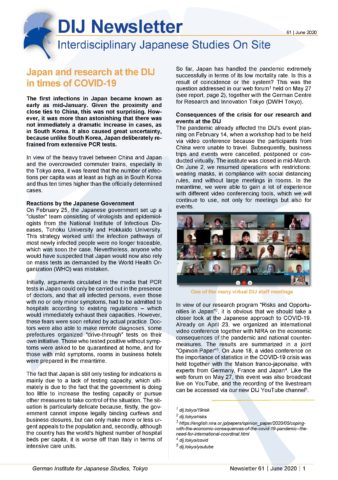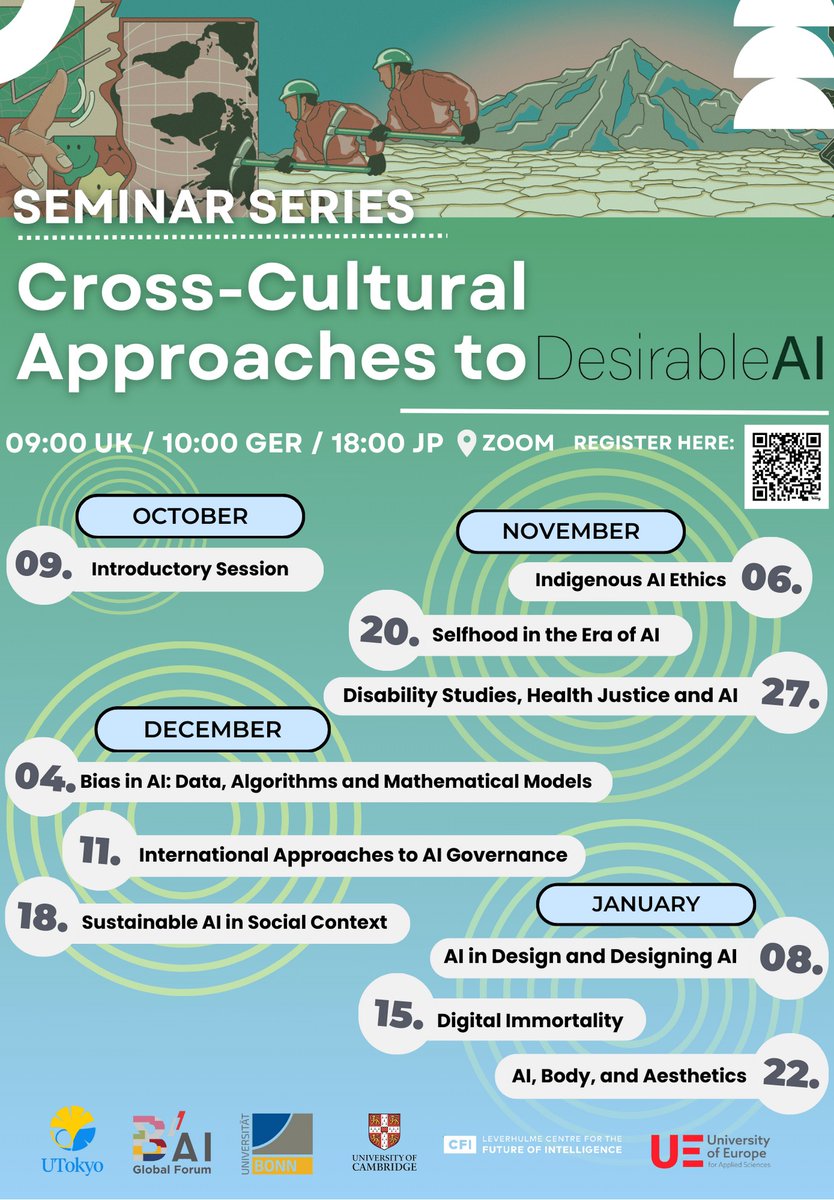イベント&アクティビティ
DIJ research at ‘Asia’s New Ruralities’ online conference
 Our research fellows Sonja Ganseforth and Isaac Gagné presented their latest research on different aspects of rural Japan at the ‘Asia’s New Ruralities’ online conference (August 12-13) at the University of Vienna. Sonja’s paper (“Remaking rurality in Japanese fishing villages”) on global dynamics and structural change in rural Japanese fishing villages emphasized the need to pay close attention to the maritime side of fishing communities. Isaac’s paper “Local Economies of Care: The Impact of Demographic Changes on Social Welfare in Rural Japan” argued that it is in the rural areas, which are often seen as the most backward, most vulnerable, and least adaptive, where some of the most innovative transformations in welfare have been taking place. Among others they were joined by former DIJ research fellow Hanno Jentzsch who gave a presentation on “Wine Tourism and Rural Revitalization in Yamanashi”, based on fieldwork he conducted during his time at the DIJ. The full conference programme and abstracts are available here.
Our research fellows Sonja Ganseforth and Isaac Gagné presented their latest research on different aspects of rural Japan at the ‘Asia’s New Ruralities’ online conference (August 12-13) at the University of Vienna. Sonja’s paper (“Remaking rurality in Japanese fishing villages”) on global dynamics and structural change in rural Japanese fishing villages emphasized the need to pay close attention to the maritime side of fishing communities. Isaac’s paper “Local Economies of Care: The Impact of Demographic Changes on Social Welfare in Rural Japan” argued that it is in the rural areas, which are often seen as the most backward, most vulnerable, and least adaptive, where some of the most innovative transformations in welfare have been taking place. Among others they were joined by former DIJ research fellow Hanno Jentzsch who gave a presentation on “Wine Tourism and Rural Revitalization in Yamanashi”, based on fieldwork he conducted during his time at the DIJ. The full conference programme and abstracts are available here.
Japan and the Tokyo Olympics: Author Interviews on DIJ YouTube channel
 On July 24, 2020, more than one billion people worldwide were expected to watch the opening ceremony of the 2020 Tokyo Olympics. What was supposed to be a glorious year for Japan, 2020 instead catapulted the world into a pandemic, sees the Olympic Games postponed and their future for Tokyo uncertain. Despite its postponement and potential cancellation, the build-up to the 2020 Olympic Games has already had a major impact on Tokyo, Japan, and the many stakeholders in government, business, and society involved. The publication Japan Through the Lens of the Tokyo Olympics (Routledge 2020) explains this multifaceted impact and is available open access (free download). To learn more about the book’s chapters you can watch interviews with our authors on the new DIJ YouTube channel. The playlist will be updated periodically. In the first episode, main editor and DIJ deputy director Barbara Holthus introduces the book and her own chapter on volunteering.
On July 24, 2020, more than one billion people worldwide were expected to watch the opening ceremony of the 2020 Tokyo Olympics. What was supposed to be a glorious year for Japan, 2020 instead catapulted the world into a pandemic, sees the Olympic Games postponed and their future for Tokyo uncertain. Despite its postponement and potential cancellation, the build-up to the 2020 Olympic Games has already had a major impact on Tokyo, Japan, and the many stakeholders in government, business, and society involved. The publication Japan Through the Lens of the Tokyo Olympics (Routledge 2020) explains this multifaceted impact and is available open access (free download). To learn more about the book’s chapters you can watch interviews with our authors on the new DIJ YouTube channel. The playlist will be updated periodically. In the first episode, main editor and DIJ deputy director Barbara Holthus introduces the book and her own chapter on volunteering.
Franz Waldenberger in NHK World interview on recent stock market developments

The value of tender offers, i.e. public takeover bids to purchase a major portion or all of a companies outstanding stock, have risen to a record in Japan this year. According to some experts the surge has been caused by the COVID-19 crisis because companies are now rushing to consolidate amid the business slowdown. On NHK World TV, DIJ director Franz Waldenberger explains what the increase in tender offers means for the Japanese economy and how the surge is related to the digital transformation. The interview was broadcast on NHK World’s Newsroom Tokyo programme on July 14, 2020 and can be viewed for one month on NHK World’s website.
DIJ research presentations at SASE Virtual Conference

DIJ research fellows Susanne Brucksch and Markus Heckel will participate in the 32nd Annual Meeting of the Society for the Advancement of Socio-Economics (SASE). This year’s meeting will be held online from July 18-21.
Susanne will participate as a discussant in the Roundtable “Economy, Society, Polity: Global and National Health(care) Lessons from the Covid-19 Pandemic”. She will also present her paper “Innovation Activities through Medtech Partnerships in Japan?” which highlights current efforts to increase medtech partnerships, cluster policies and matching-hubs to cross disciplinary and organizational boundaries and to encourage innovation activities in the field of medical devices in Japan.
Markus will present two papers: “Deflation – Lessons from the Japanese Experience”, co-authored with DIJ director Franz Waldenberger, applies the quantity theory of money and international arbitrage conditions. It suggests that expansionary monetary policies are very limited in fighting deflation in Japan. Markus’ paper “Central Bank Communication under Unconventional Monetary Policy: The Bank of Japan during Times of Crisis” analyzes the monetary policy and central bank communication of the Bank of Japan during 2003-2019 with a focus on the global financial crises and the Fukushima nuclear disaster. Results show that the complexity of monetary policy can be reduced to forms of “general” monetary policy with quantitative easing and short-term liquidity emergency measures used in crisis times.
New issue of DIJ Newsletter published
 The latest issue of our DIJ Newsletter features reflections on the impact of COVID-19 on Japan and Japanese Studies, summarizes our first web forum on the pandemic in Germany and Japan, and introduces a new DIJ research project on Digital Transformation as well as a book publication on the Olympic Games. We also congratulate one of our colleagues on the receipt of a prestigious award, give an update on recent publications, and announce recent personnel changes in our “Staff News” section.
The latest issue of our DIJ Newsletter features reflections on the impact of COVID-19 on Japan and Japanese Studies, summarizes our first web forum on the pandemic in Germany and Japan, and introduces a new DIJ research project on Digital Transformation as well as a book publication on the Olympic Games. We also congratulate one of our colleagues on the receipt of a prestigious award, give an update on recent publications, and announce recent personnel changes in our “Staff News” section.
Visit our DIJ Newsletter webpage to download the most recent issue or to order your free print copy.
Webinar on ‘Tokyo Olympics Postponed: How Japanese Society Responds’
 Originally scheduled to begin on July 24, 2020, the Tokyo Olympics have been postponed to July 2021. This is a dilemma: The Olympics were supposed to present a brand-new Japan to the world, a leader in sustainability, diversity, inclusion, and a slew of other admirable goals. But almost overnight, Tokyo’s buzz of Olympic logos, countdown clocks and construction hustle have come to an eerie standstill: What now? Join sociologist and DIJ deputy director Barbara Holthus, editor of Japan Through the Lens of the Tokyo Olympics and Ulrike Schaede, former member of the DIJ’s advisory board, on July 15, 8:30 a.m. (JST) in this UC San Diego Japan Forum Webinar for a discussion of how the postponement has affected the various stakeholders in society: athletes with crushed aspirations, para-Olympians with broken dreams, disappointed volunteers, empty-handed ticket holders, devastated inn- and shopkeepers, jubilant anti-Olympic movement participants, among Tokyoites and in the periphery.
Originally scheduled to begin on July 24, 2020, the Tokyo Olympics have been postponed to July 2021. This is a dilemma: The Olympics were supposed to present a brand-new Japan to the world, a leader in sustainability, diversity, inclusion, and a slew of other admirable goals. But almost overnight, Tokyo’s buzz of Olympic logos, countdown clocks and construction hustle have come to an eerie standstill: What now? Join sociologist and DIJ deputy director Barbara Holthus, editor of Japan Through the Lens of the Tokyo Olympics and Ulrike Schaede, former member of the DIJ’s advisory board, on July 15, 8:30 a.m. (JST) in this UC San Diego Japan Forum Webinar for a discussion of how the postponement has affected the various stakeholders in society: athletes with crushed aspirations, para-Olympians with broken dreams, disappointed volunteers, empty-handed ticket holders, devastated inn- and shopkeepers, jubilant anti-Olympic movement participants, among Tokyoites and in the periphery.
Please download the event flyer for information on how to register for this event.
Future Visions of a (Digital) Public Sphere:
Findings from Japan

With the pandemic since early 2020, the use of online platforms has increased in most societies. Consequently, providers of digital platforms have gained substantial influence on how people inform themselves, for example about the novel coronavirus or political topics. However, many posts and publications include falsified or unproven data (better known as “fake news”), also in Japan. In the course of our research we raise the question how the status quo and the future of the aforementioned digital platforms can be explored collectively with regards to issues like fake news, democratic values or privacy. We argue that the resulting scenarios, which arise from the subjective experiences of their speculators and, hence, reveal individual hopes and fears, allow us to explore and discuss utopian and dystopian visions of technological futures and alternative realities. Details
Speakers:
Michel Hohendanner, Munich University of Applied Sciences
Chiara Ullstein, Technical University of Munich
Murata Sayaka’s Convenience Store Woman: Discussing Gender Identity and Society in Contemporary Japanese Literature
Lecture Series ‘Gender and Sexuality in East Asia’ (3/5)
A convenience store is a reflection of Japan’s society. The way people behave, act, react, and interact is a display of contemporary Japan’s common sense. It reveals how social life is organized in terms of interpersonal relations, habits, norms, values, etc. What, however, happens when someone does not fit Japan’s common sense? This presentation will elaborate on how Murata addresses the fundamental question of an individual’s place within society by focusing on how the novel deals with social conventions, gender constructions, and work. The analysis of these issues shows how Murata deconstructs Japan’s common sense and reveals its naturalized, unspoken, and taken-for-granted rules that organize contemporary Japanese society. Details
Speaker:
Ronald Saladin, Trier University








 Open Access
Open Access
